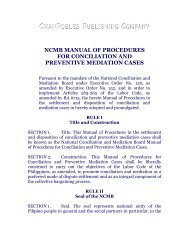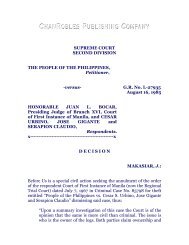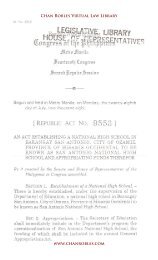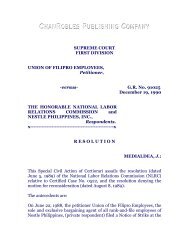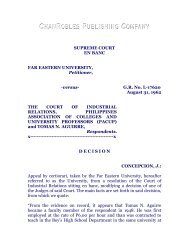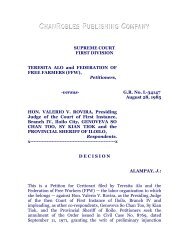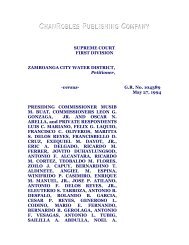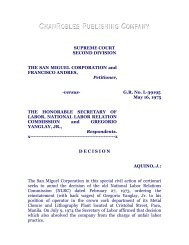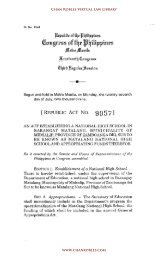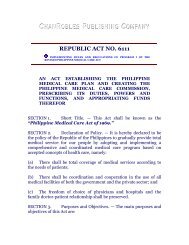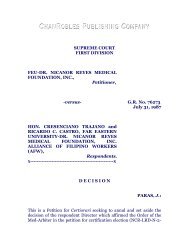IBM Philippines, Inc. vs. NLRC - Chan Robles and Associates Law ...
IBM Philippines, Inc. vs. NLRC - Chan Robles and Associates Law ...
IBM Philippines, Inc. vs. NLRC - Chan Robles and Associates Law ...
Create successful ePaper yourself
Turn your PDF publications into a flip-book with our unique Google optimized e-Paper software.
2. THE NATIONAL LABOR RELATIONS COMMISSION<br />
COMMITTED GRAVE ABUSE OF DISCRETION<br />
TANTAMOUNT TO LACK OR EXCESS OF ITS<br />
JURISDICTION IN HOLDING THAT EVEN IF THE<br />
COMPUTER PRINTOUTS WERE ADMISSIBLE,<br />
PETITIONER FAILED TO SATISFY DUE PROCESS.<br />
We find petitioners' contention to be without merit.<br />
First. Petitioners argue that the computer print-outs submitted by<br />
them need not be identified or authenticated according to the rules of<br />
procedure in regular courts in order for the same to be admissible in<br />
evidence. They contend that technical rules of evidence do not apply<br />
to administrative/labor cases [20] <strong>and</strong> because of a relaxation of the<br />
rules of evidence, private respondent was in fact allowed by the labor<br />
arbiter to adduce additional evidence even after a decision had been<br />
rendered. [21] chanroblespublishingcompany<br />
It is indeed true that administrative agencies, such as the <strong>NLRC</strong>, are<br />
not bound by the technical rules of procedure <strong>and</strong> evidence in the<br />
adjudication of cases. [22] This was the reason private respondent was<br />
allowed to submit additional evidence even after the case was deemed<br />
submitted for resolution by the labor arbiter. The practice of<br />
admitting additional evidence on appeal in labor cases has been<br />
sanctioned by this Court. [23] chanroblespublishingcompany<br />
However, the liberality of procedure in administrative actions is<br />
subject to limitations imposed by basic requirements of due process.<br />
As this Court said in Ang Tibay <strong>vs</strong>. CIR, [24] the provision for flexibility<br />
in administrative procedure "does not go so far as to justify orders<br />
without a basis in evidence having rational probative value." More<br />
specifically, as held in Uichico <strong>vs</strong>. <strong>NLRC</strong>: [25] chanroblespublishingcompany<br />
It is true that administrative <strong>and</strong> quasi-judicial bodies like the<br />
<strong>NLRC</strong> are not bound by the technical rules of procedure in the<br />
adjudication of cases. However, this procedural rule should not<br />
be construed as a license to disregard certain fundamental<br />
evidentiary rules. While the rules of evidence prevailing in the<br />
courts of law or equity are not controlling in proceedings before



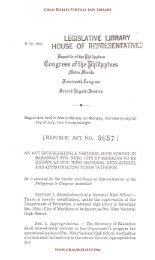
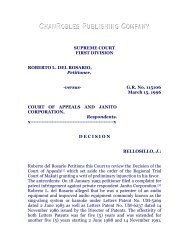
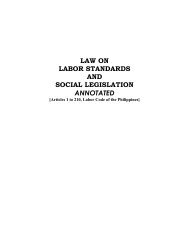
![Aurelio vs. NLRC, (221 SCRA 432 [1993]) - Chan Robles and ...](https://img.yumpu.com/51280528/1/190x245/aurelio-vs-nlrc-221-scra-432-1993-chan-robles-and-.jpg?quality=85)
